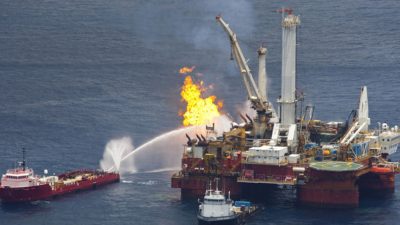Trump Administration’s Rollback of Offshore-drilling Safety Regulations Enacted after the BP Deepwater Horizon Disaster
Revisions Hit Blowout Preventer Rule Enacted After Deepwater Horizon Disaster

The Trump administration today moved to weaken another offshore drilling safety rule enacted after the BP Deepwater Horizon disaster, the worst environmental catastrophe in U.S. history.
Today’s proposed changes to the safety rule known as the “Blowout Preventer Systems and Well Control Rule” were issued in response to President Trump’s order to reduce regulations on fossil fuel companies. The move comes just months after the administration released an unprecedented plan to vastly expand offshore oil and gas drilling into all U.S. oceans.
“Workers and wildlife will pay a terrible price if these rollbacks are finalized. The next offshore oil disaster is inevitable, especially if the Trump administration keeps ignoring Deepwater Horizon’s lessons,” said Kristen Monsell, ocean legal director at the Center for Biological Diversity. “Regulations adopted after BP’s catastrophic failures in the Gulf of Mexico weren’t strong enough to begin with. To rescind those rules is reckless beyond words.”
The Deepwater Horizon disaster — which began on April 20, 2010 — killed 11 oil workers and spewed more than 210 million gallons of oil into the Gulf for nearly three months, killing thousands of marine mammals, sea turtles and birds. Federal investigators determined that a defective blowout preventer was one of the causes.
Following Deepwater Horizon the Obama administration enacted a set of offshore-drilling safety rules, in consultation with the oil industry, and established the Bureau of Safety and Environmental Enforcement to regulate offshore drilling.
Bureau Director Scott Angelle, a Louisiana politician with deep ties to the oil industry, in December proposed to weaken another rule regarding production safety systems.
Today’s target, the well-control rule, focused on the standard for blowout preventers, devices used to monitor and seal oil and gas wells when operations go awry. The proposed changes would delete or amend several provisions of the rule, including eliminating the requirement that the Bureau certify the third parties that inspect offshore safety equipment and allowing industry more flexibility in their use of real-time monitoring of deepwater drilling operations.
The Bureau announced the proposed changes on a call today and said it will send the proposed changes to the Federal Register today, to be published early next week. The Bureau will accept public comment on the proposed changes for 60 days.
“Risking people’s lives to increase oil-company profits is just immoral,” Monsell said. “Trump and Angelle don’t seem to realize their job is to serve the public, not the oil industry.”

